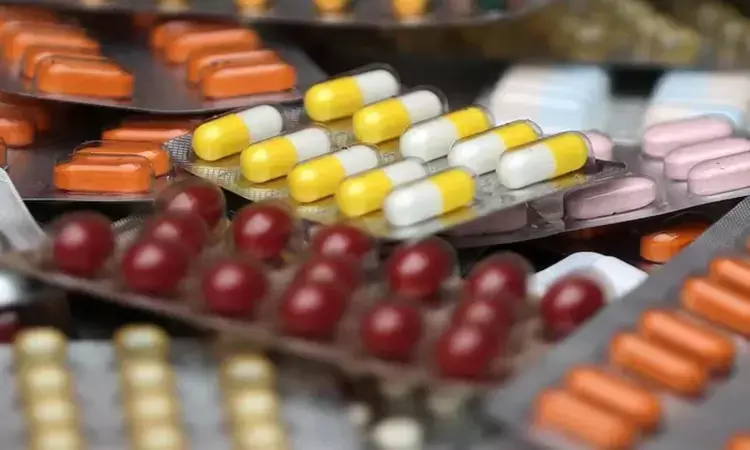- Home
- Medical news & Guidelines
- Anesthesiology
- Cardiology and CTVS
- Critical Care
- Dentistry
- Dermatology
- Diabetes and Endocrinology
- ENT
- Gastroenterology
- Medicine
- Nephrology
- Neurology
- Obstretics-Gynaecology
- Oncology
- Ophthalmology
- Orthopaedics
- Pediatrics-Neonatology
- Psychiatry
- Pulmonology
- Radiology
- Surgery
- Urology
- Laboratory Medicine
- Diet
- Nursing
- Paramedical
- Physiotherapy
- Health news
- Fact Check
- Bone Health Fact Check
- Brain Health Fact Check
- Cancer Related Fact Check
- Child Care Fact Check
- Dental and oral health fact check
- Diabetes and metabolic health fact check
- Diet and Nutrition Fact Check
- Eye and ENT Care Fact Check
- Fitness fact check
- Gut health fact check
- Heart health fact check
- Kidney health fact check
- Medical education fact check
- Men's health fact check
- Respiratory fact check
- Skin and hair care fact check
- Vaccine and Immunization fact check
- Women's health fact check
- AYUSH
- State News
- Andaman and Nicobar Islands
- Andhra Pradesh
- Arunachal Pradesh
- Assam
- Bihar
- Chandigarh
- Chattisgarh
- Dadra and Nagar Haveli
- Daman and Diu
- Delhi
- Goa
- Gujarat
- Haryana
- Himachal Pradesh
- Jammu & Kashmir
- Jharkhand
- Karnataka
- Kerala
- Ladakh
- Lakshadweep
- Madhya Pradesh
- Maharashtra
- Manipur
- Meghalaya
- Mizoram
- Nagaland
- Odisha
- Puducherry
- Punjab
- Rajasthan
- Sikkim
- Tamil Nadu
- Telangana
- Tripura
- Uttar Pradesh
- Uttrakhand
- West Bengal
- Medical Education
- Industry
Health Ministry Plans Licence Suspension for Drugs Failing Quality Standards: Report

Safipur CHC Burns Medicines, Investigation Launched
New Delhi: The Union Health Ministry is planning a regulatory overhaul that could result in the immediate suspension of product licenses for drugmakers whose products are declared not of standard quality (NSQ) by government testing laboratories.
The move, aimed at ensuring drug quality and public safety, is currently under discussion with various state regulators.
According to a recent media report in the Economic Times, the government intends to issue a notification soon, mandating swift punitive action against companies whose products fail quality tests. Discussions are also underway with stakeholders including state governments and pharmaceutical industry bodies.
The proposal comes in the backdrop of concerns over the rising number of NSQ alerts issued by the Central Drugs Standard Control Organisation (CDSCO). While the health ministry leads the initiative, the CDSCO is in active consultation with pharma associations that have expressed strong reservations about the proposed measures.
Earlier, the Drugs Technical Advisory Board (DTAB) — the apex advisory body on technical matters related to drugs under the CDSCO — had recommended the idea of prompt regulatory action in such cases. As per the official minutes of the board meeting:
"The board noted that it is very important that once a drug is declared NSQ, the license of such product shall be suspended immediately in public interest unless a satisfactory corrective action and preventive action (CAPA) is submitted by such manufacturers. After detailed deliberation, DTAB recommended for the appropriate amendment in the Drug Rules in this regard and the suspension product licence should be revoked only after root cause analysis and corresponding CAPA has been implemented."
A senior government official, speaking to ET on condition of anonymity, added:
"The health ministry and the CDSCO is taking a step forward by taking views of the states and pharma bodies as it would require a notification."
Also Read: Substandard Drugs to Face Immediate License Suspension Under DTAB's New Recommendation
Meanwhile, industry groups have voiced concern over the draft approach. In its representation to the government, the Federation of Pharma Entrepreneurs (FOPE) argued that NSQ incidents are often not due to intentional wrongdoing but technical lapses.
“NSQ is a global phenomenon, and most of the time, it is due to technical issues without any wrongful intent,” FOPE stated.
Pharma associations also pointed to inconsistencies in test results from government labs and raised questions about GLP (Good Laboratory Practices) compliance.
“This has been a long-standing concern. It is also necessary that the NSQ investigation includes a review of records and data from government testing laboratories, as well as GLP compliance by the Drugs Inspector,” a member of one such group told ET.
“It has been found that in many cases, samples declared NSQ by government labs, when challenged and tested by CDL Kolkata, have been declared as Standard Quality by CDL Kolkata, which is an appellate laboratory,” the person added.
In addition to questioning the reliability of some NSQ assessments, drugmakers emphasized the need to focus on enhancing the recall mechanism rather than imposing automatic licence suspensions.
FOPE also cautioned the ministry to undertake a detailed impact analysis before finalising the proposal, noting the potential unintended consequences:
"We fear it may lead to malpractices in the profession, and genuine manufacturers with investments of hundreds of crores in plant setup, product development, technical team development, brand development, business development, and goodwill, may be adversely impacted if actions like the suspension of product permission are taken without proper investigation."
Farhat Nasim joined Medical Dialogue an Editor for the Business Section in 2017. She Covers all the updates in the Pharmaceutical field, Policy, Insurance, Business Healthcare, Medical News, Health News, Pharma News, Healthcare and Investment. She is a graduate of St.Xavier’s College Ranchi. She can be contacted at editorial@medicaldialogues.in Contact no. 011-43720751


